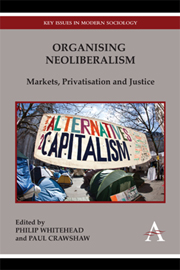Book contents
- Frontmatter
- Contents
- Chapter 1 Introduction: A Preliminary Mapping of the Terrain
- Chapter 2 Neoliberalism and Crime in the United States and the United Kingdom
- Chapter 3 Neoliberalism, Prisons and Probation in the United States and England and Wales
- Chapter 4 The Neoliberal Wings of the ‘Smoke-Breathing Dragon’: The Cigarette Counterfeiting Business and Economic Development in the People's Republic of China
- Chapter 5 A Neoliberal Security Complex?
- Chapter 6 The Influence of Neoliberalism on the Development of the English Youth Justice System under New Labour
- Chapter 7 Institutionalising Commercialism? The Case of Social Marketing for Health in the United Kingdom
- Chapter 8 Neoliberal Policy, Quality and Inequality in Undergraduate Degrees
- Chapter 9 Religion and Criminal Justice in Canada, England and Wales: Community Chaplaincy and Resistance to the Surging Tide of Neoliberal Orthodoxy
- Chapter 10 Markets, Privatisation and Justice: Some Critical Reflections
- Notes on Contributors
- Index
Chapter 4 - The Neoliberal Wings of the ‘Smoke-Breathing Dragon’: The Cigarette Counterfeiting Business and Economic Development in the People's Republic of China
Published online by Cambridge University Press: 05 February 2013
- Frontmatter
- Contents
- Chapter 1 Introduction: A Preliminary Mapping of the Terrain
- Chapter 2 Neoliberalism and Crime in the United States and the United Kingdom
- Chapter 3 Neoliberalism, Prisons and Probation in the United States and England and Wales
- Chapter 4 The Neoliberal Wings of the ‘Smoke-Breathing Dragon’: The Cigarette Counterfeiting Business and Economic Development in the People's Republic of China
- Chapter 5 A Neoliberal Security Complex?
- Chapter 6 The Influence of Neoliberalism on the Development of the English Youth Justice System under New Labour
- Chapter 7 Institutionalising Commercialism? The Case of Social Marketing for Health in the United Kingdom
- Chapter 8 Neoliberal Policy, Quality and Inequality in Undergraduate Degrees
- Chapter 9 Religion and Criminal Justice in Canada, England and Wales: Community Chaplaincy and Resistance to the Surging Tide of Neoliberal Orthodoxy
- Chapter 10 Markets, Privatisation and Justice: Some Critical Reflections
- Notes on Contributors
- Index
Summary
Introduction
The illegal trade in tobacco products is a phenomenon that only recently has gained some prominence despite the fact that it has a much longer history. There are three main schemes characterising this trade in the last two decades: (1) bootlegging: buying an amount of cigarettes that exceeds custom regulations, (2) large-scale smuggling of untaxed cigarettes diverted from licit international trade and (3) counterfeiting or manufacturing of fake brand cigarettes (Joossens 1999; von Lampe 2006). This chapter focuses on the third scheme and aims at providing an account of the social organisation of the counterfeiting business in the People's Republic of China (hereinafter, China), generally believed to be the main source for counterfeit cigarettes worldwide. According to recent estimates, up to 400 billion counterfeit cigarettes are produced in China per year (Chen 2009; Joossens, Merriman, Ross and Raw 2009), representing roughly the number of cigarettes (legal and contraband) consumed in the United Kingdom over a six-year period. China has criminalised cigarette counterfeiting through a net of general and specific laws and regulations. Section 140 (chapter 3) of the Chinese Criminal Law of 1997 has made the production and trade of counterfeit goods in general an “Offence that Undermines the Socialist Market Economy’ punishable by a range of possible sentences from a financial penalty to life imprisonment. In addition, the Chinese Law of Tobacco Exclusive Sale stipulates that legal traders who sell counterfeit tobacco products must be fined at 50 per cent of the market value of the counterfeit products seized.
- Type
- Chapter
- Information
- Organising NeoliberalismMarkets, Privatisation and Justice, pp. 81 - 104Publisher: Anthem PressPrint publication year: 2012
- 1
- Cited by

